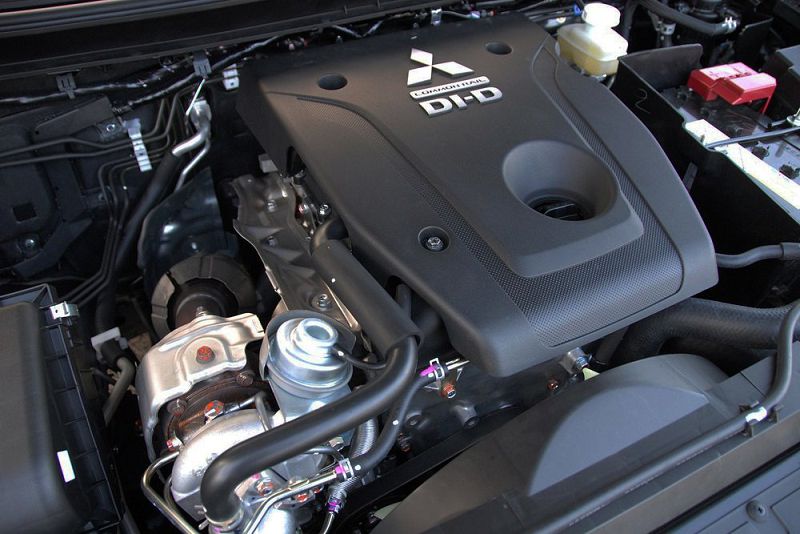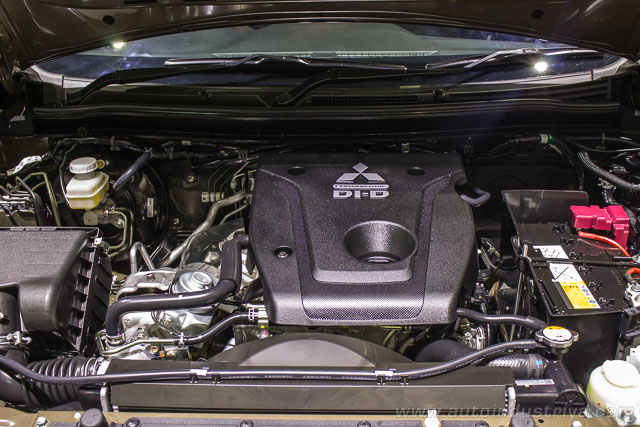The Mitsubishi 4N15 engine is a four-cylinder, 2.4-liter diesel engine that was first introduced in 2015. It is part of Mitsubishi’s new family of diesel engines, which also includes the 4N14 engine used in the Outlander.
The 4N15 engine features an aluminum block and cylinder head, and has a variable geometry turbocharger and a high-pressure common rail fuel injection system. It uses Mitsubishi’s MIVEC (Mitsubishi Innovative Valve timing Electronic Control) system, which allows for variable valve timing and lift.
In its original form, the 4N15 engine produced 178 horsepower and 317 lb-ft of torque. However, various improvements have been made over the years, including changes to the engine management system, which increased its output to 187 horsepower and 325 lb-ft of torque in its most powerful version.
Engine specifications for Mitsubishi 4N15 2.4 DiD
| Displacement | 2442 cc |
| Power system | Common Rail |
| Engine power | 154 – 181 hp |
| Torque | 380 – 430 Nm |
| Cylinder block | Aluminum R4 |
| Cylinder head | Aluminum 16v |
| Cylinder diameter | 86 mm |
| Stroke | 105.1 mm |
| Compression ratio | 15.5 |
| Engine features | intercooler |
| Hydraulic compensators | No |
| Timing Chain/Belt | Chain |
| Variable Valve Timing (VVT) | MIVEC |
| Turbocharger | VGT |
| Oil capacity/Recommended oil | 8.4 l 5W-30 |
| Fuel type | Diesel |
| Euro class | EURO 5 |
| Average lifespan | 300 000 km |
The dry weight of the 4N15 engine is 163 kg
Engine number 4N15 is located on the cylinder block
Is the Mitsubishi 4N15 2.4 engine good?
The Mitsubishi 4N15 2.4 engine has received generally positive reviews and is considered to be a good engine overall. Here are some reasons why:
- Power output: The engine produces around 177 horsepower and 317 lb-ft of torque, which is good for a 2.4-liter diesel engine. This provides good acceleration and pulling power.
- Fuel efficiency: The engine is designed with a common rail fuel injection system, which helps to improve fuel efficiency and reduce emissions.
- Durability: The engine has a cast iron block and aluminum cylinder head, which makes it durable and able to withstand high mileage.
- Smooth operation: The engine has a balance shaft, which helps to reduce vibrations and provide a smooth and comfortable ride.
- Low noise and vibration: The engine is designed with a number of features to reduce noise and vibration, including an electronically controlled common rail fuel injection system, which helps to reduce engine noise.
- Reduced emissions: The engine is designed to meet stringent emissions standards, which makes it a good choice for those who live in areas with strict emissions regulations.
- Advanced features: The Mitsubishi 4N15 2.4 engine is equipped with advanced features such as variable geometry turbocharger (VGT) and variable valve timing (VVT), which help to improve engine performance and fuel efficiency.
- Aftermarket support: The engine has a good following in the automotive community, which means that there are plenty of aftermarket parts and upgrades available for those who want to increase its power output or customize their vehicle.
It’s important to note that the Mitsubishi 4N15 2.4 engine has been known to have some issues, including DPF (Diesel Particulate Filter) problems and turbocharger failures, as mentioned earlier. Regular maintenance and care can help prevent or reduce the severity of these issues. It’s also important to have any problems diagnosed and repaired by a qualified mechanic to ensure that the engine runs properly and efficiently.
Oil specifications and capacity
The Mitsubishi 4N15 2.4 engine requires a specific type of oil and has a recommended oil capacity. Here are the oil specifications and capacity for the engine:
Oil specifications:
- Recommended oil type: 5W-30 or 0W-30 synthetic diesel engine oil
- Oil standard: API CJ-4 or ACEA E9
Oil capacity:
- Engine oil capacity (including filter): 5.7 quarts or 5.4 liters
- Engine oil capacity (without filter): 5.3 quarts or 5.0 liters
It’s important to note that the engine oil should be changed at regular intervals to ensure the engine runs smoothly and efficiently. The recommended oil change interval for the Mitsubishi 4N15 2.4 engine is every 7,500 miles or 12 months, whichever comes first. However, this may vary depending on driving conditions and usage, so it’s important to consult the owner’s manual or a qualified mechanic for specific recommendations.
When changing the oil, it’s also recommended to replace the oil filter with a new one. The oil filter for the Mitsubishi 4N15 2.4 engine is typically a cartridge-style filter, which should be replaced at every oil change.
Fuel consumption
A table of estimated fuel consumption for the Mitsubishi 4N15 engine:
| Vehicle Model | MPG (Miles per gallon) | L/100 km (Liters per 100 kilometers) |
|---|---|---|
| Mitsubishi Triton | 22 – 36 | 10.7 – 6.5 |
| Mitsubishi Pajero Sport | 26 – 34 | 9.0 – 7.0 |
| Mitsubishi Outlander | 30 – 35 | 7.8 – 6.7 |
Please note that these are estimates based on official fuel economy ratings and actual fuel economy can vary depending on factors such as vehicle weight, transmission type, driving conditions, and more. It is recommended to refer to the official fuel economy ratings of a specific Mitsubishi model equipped with the 4N15 engine for a more accurate estimate.

What cars use the Mitsubishi 4N15 2.4 l
| Mitsubishi L200 | 2015 – … |
| Mitsubishi Pajero Sport | 2015 – … |
| Mitsubishi Triton | 2015 – … |
Maintenance for the Mitsubishi 4N15 engine
Is a table of the maintenance intervals and costs for the Mitsubishi 4N15 engine:
| Maintenance Task | Interval | Cost Range |
|---|---|---|
| Oil and Filter Change | 7,500-10,000 miles (12,000-16,000 km) | $50-$100 |
| Air Filter Replacement | 15,000-30,000 miles (24,000-48,000 km) | $20-$50 |
| Spark Plug Replacement | 60,000-100,000 miles (96,000-160,000 km) | $100-$300 |
| Timing Belt Replacement | 90,000-100,000 miles (144,000-160,000 km) | $400-$600 |
| Water Pump Replacement | 90,000-100,000 miles (144,000-160,000 km) | $200-$400 |
| Fuel Filter Replacement | 30,000-50,000 miles (48,000-80,000 km) | $50-$100 |
| Transmission Fluid Change | 30,000-60,000 miles (48,000-96,000 km) | $100-$200 |
| Differential Fluid Change | 30,000-60,000 miles (48,000-96,000 km) | $50-$100 |
| Brake Fluid Change | 2 years or 30,000 miles (48,000 km) | $50-$100 |
| Coolant Flush and Fill | 2-5 years or 30,000-50,000 miles (48,000-80,000 km) | $100-$200 |
Please note that the costs listed above are rough estimates and may vary depending on the location, the mechanic, and the specific parts used. It is recommended to refer to the vehicle owner’s manual or contact a certified Mitsubishi mechanic for specific maintenance recommendations and costs.

Problems
The Mitsubishi 4N15 engine has been known to have some problems reported by users. Some of the most common issues include:
- Diesel Particulate Filter (DPF) problems: The DPF can get clogged due to various reasons such as short journeys, low-quality fuel, and incorrect oil usage. This can cause the engine to enter limp mode, which reduces performance.
- Turbocharger failures: The turbocharger can fail due to oil starvation or carbon buildup, resulting in a loss of power and an illuminated warning light.
- Fuel injectors issues: The fuel injectors can malfunction, resulting in reduced engine performance, misfiring, and increased emissions.
- Timing chain problems: The timing chain can become noisy and eventually fail, which can cause serious engine damage.
- EGR valve problems: The EGR valve can fail, resulting in increased emissions and reduced engine performance.
- Oil leaks: Some Mitsubishi 4N15 engines have been known to develop oil leaks from the crankshaft seal, oil pump seal, or valve cover gasket, which can result in reduced engine oil levels and potential damage to the engine.
- Engine overheating: The engine may overheat due to various reasons such as a faulty thermostat, low coolant levels, or a malfunctioning water pump. Overheating can cause engine damage and should be addressed immediately.
- Camshaft sensor failure: The camshaft sensor can fail, which can cause misfires, reduced engine performance, and an illuminated check engine light.
- Intake manifold issues: The intake manifold can become clogged with carbon deposits, which can reduce engine performance and fuel efficiency.
- High-pressure fuel pump problems: The high-pressure fuel pump can fail due to excessive wear or contamination, resulting in reduced engine performance and fuel efficiency.
The Mitsubishi 4N15 engine has been known to have some issues, but with proper maintenance and timely repairs, most of these issues can be avoided or resolved. It’s important to have your engine serviced regularly by a qualified technician to ensure that it runs smoothly and efficiently.
Price range for a used and remanufactured engine
| Condition | Price Range |
|---|---|
| Used | $1,500-$3,500 |
| Remanufactured | $3,000-$5,000 |
Please note that the prices listed above are only a rough estimate and may vary significantly depending on the specific circumstances such as the condition of the engine, location, and supplier. It is recommended to research and compare prices from multiple suppliers before making a purchase decision. Additionally, it’s important to consider any additional costs such as installation fees, shipping costs, and taxes.
0 Comments